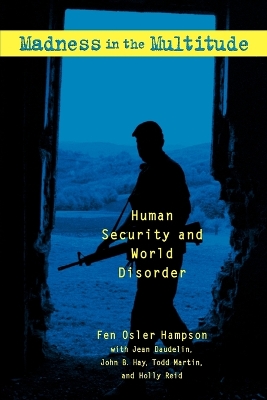Madness in the Multitude explores the nature of human security in the contemporary world. At one level, human security is about "freedom from fear" and alleviating the plight of innocent victims of armed conflict. Civil strife in many corners of the globe--East Timor, Bosnia, Kosovo, Rwanda, Burundi, Sudan, Georgia, Tajikistan--have witnessed extraordinary violence directed at civilians, especially the most vulnerable citizens in society such as women and
children. International efforts to curb the production and use of anti-personnel landmines, half the proliferation and spread of small arms, and strengthen international prohibitions against the most egregious
violations of human rights through the establishment of an International Criminal Court are directed at augmenting human security. But at another level, the concept of human security addresses a much wider set of concerns. There are those who argue that human security is not just about "freedom from fear" but also "freedom from want" and other kinds of deprivation. These advocates point to the adverse affects of globalization on human development and the problems of achieving social justice in
a world where the forces of globalization have unequal impacts on the distribution of wealth and income. According to this view, the widening gap between the world's richest and poorest countries is a
major cause for concern as are a wide range of nonmilitary threats to human health and survival such as AIDS, water and air-borne pollutants, and the general deterioration of the biosphere. In a wide-ranging theoretical and empirical analysis, Madness in the Multitude examines the different meanings and understanding of the concept of human security and how the concept of human security has evolved over the past two centuries. Through case studies of the
International Criminal Court, the Anti-personnel Landmines Treaty, international efforts to control small arms, military intervention in Kosovo and elsewhere, and the work of international development agencies and
lending institutions, this book asks whether there is a new human security "paradigm" of international politics and what the implications of this paradigm for international order are. The volume suggests that human security constitutes a new kind of global public good whose provision challenges our traditional conceptions about the purpose and function of international institutions, the role of civil society, and the nature of power in international politics. This book explores how our
conceptions of human security have evolved in the latter half of the twentieth century, analyzing the debate about how best to promote and advance human security.
- ISBN10 0195415248
- ISBN13 9780195415247
- Publish Date 18 October 2001
- Publish Status Active
- Publish Country CA
- Imprint Oxford University Press, Canada
- Format Hardcover
- Pages 216
- Language English
